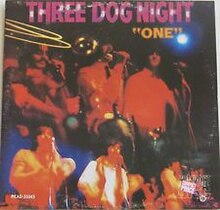One (Filter song)
| "One" | ||||
|---|---|---|---|---|
| Single by Harry Nilsson | ||||
| from the album Aerial Ballet | ||||
| B-side | "Sister Marie" | |||
| Released | 1968 | |||
| Recorded | 1967 | |||
| Genre | Chamber pop | |||
| Label | RCA | |||
| Writer(s) | Harry Nilsson | |||
| Producer(s) | Rick Jarrard | |||
| Harry Nilsson singles chronology | ||||
|
||||
| "One" | ||||
|---|---|---|---|---|
 |
||||
| Single by Three Dog Night | ||||
| from the album Three Dog Night | ||||
| B-side | "Chest Fever" | |||
| Released | April 1969 | |||
| Recorded | 1968 | |||
| Length | 3:06 | |||
| Label | Dunhill | |||
| Writer(s) | Harry Nilsson | |||
| Producer(s) | Gabriel Mekler | |||
| Three Dog Night singles chronology | ||||
|
||||
"One" is a song written by Harry Nilsson and made famous by Three Dog Night whose recording reached number five on the U.S. Billboard Hot 100 in 1969 and number four in Canada. The song is known for its opening line "One is the loneliest number that you'll ever do". Nilsson wrote the song after calling someone and getting a busy signal. He stayed on the line listening to the "beep, beep, beep, beep..." tone, writing the song. The busy signal became the opening notes of the song.
In 1968, Al Kooper released the song on his debut album I Stand Alone. In 1969, the song was recorded by Australian pop singer Johnny Farnham, reaching number four on the Go-Set National Top 40 Chart.
"One" was released as the second single from Three Dog Night's eponymous first album. It was a major North American hit and became their first of seven gold records over the next five years.
The song reached number five on the U.S. Billboard Hot 100 and spent three weeks at number two on the Cash Box Top 100. It also reached number four in Canada.
John Farnham, released as a double-sided single with "Mr. Whippy" in 1969.
...
Wikipedia
